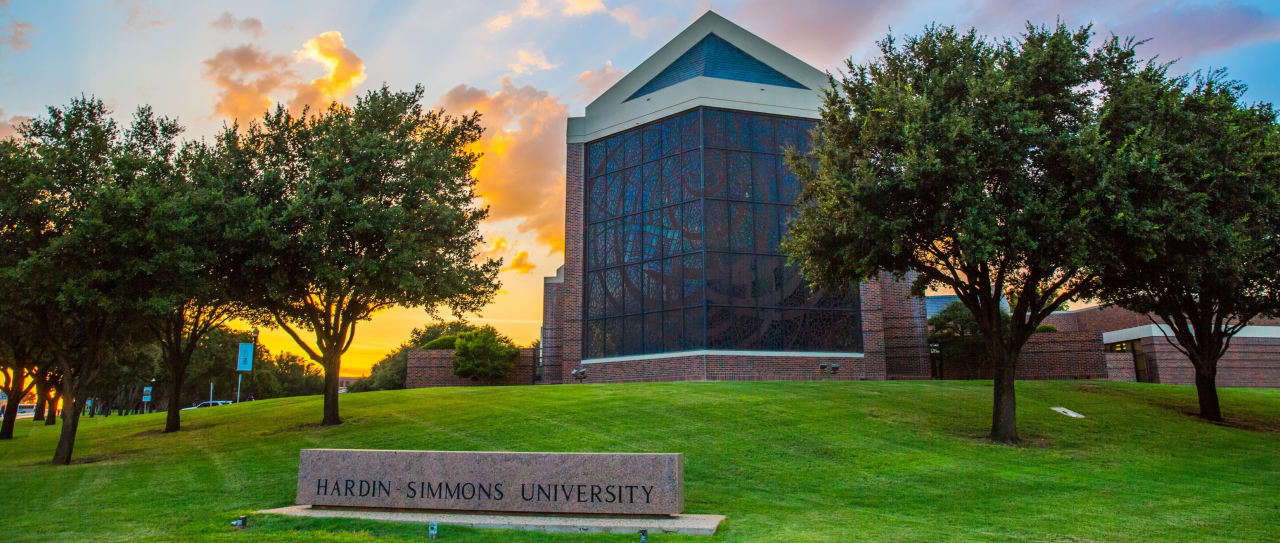
Bachelor of Science in Biology
Hardin-Simmons University

Key Information
Campus location
Abilene, USA
Languages
English
Study format
On-Campus
Duration
4 years
Pace
Full time
Tuition fees
USD 29,526 / per year *
Application deadline
Request info
Earliest start date
Request info
* full-time undergraduate tuition & fees; 12-17 hours per semester; does not include course-specific fees
Introduction
A major in Biology prepares you for a wide variety of career options. You may choose one of our human health tracks and pursue entrance into allied health professional schools and graduate programs such as medical, dental, physician assistant, pharmacy, public health, physical or occupational therapy, optometry, chiropractic, and veterinary medicine. You may choose an organismal biology or ecology track and pursue careers or graduate studies in areas such as wildlife biology, conservation biology, botany, ecology, environmental science, and many other biology subdisciplines. Regardless of which track you choose to pursue, our faculty strives to ensure you will be well-prepared and equipped to begin your career or continue to your next step.
The learning outcomes and curriculum in Biology are designed around recommendations included in Vision and Change in Undergraduate Biology Education: A Call to Action, a report released by the American Association for the Advancement of Science (AAAS). The knowledge, competencies, and skills you will gain prepares you to pursue a career or further advanced study in biology.
At HSU you have the opportunity to study Biology in an environment enriched by Christian faith and values. The Biology faculty is dedicated to providing a challenging learning environment where you are encouraged to explore the connections between faith and science.
Mission and Learning Outcomes
The Mission of the Department of Biology is to provide quality science education and research experiences in our unique university environment. Our goals include:
- Providing a foundation in biological principles for non-major students;
- Modeling scientific teaching for 7-12 Life Sciences Education majors;
- Preparing students for professional, pre-professional, or graduate education in the life sciences ranging from molecules to ecosystems.
Biology Program Learning Outcomes
- Biology graduates will recognize core biological principles, including evolution, the relationship between structure and function, and information flow at all levels of biological organization.
- Biology graduates will explain and apply the scientific method, including designing, experimenting, and analyzing data.
- Biology graduates will analyze data, identify key results, and critically review primary scientific literature.
- Biology graduates will communicate biological information in oral and written form.
- Biology graduates will apply ethics to the daily practice of biology in research and medicine.
Gallery
Admissions
Curriculum
BS Core Curriculum
Departmental Requirements
- General Chemistry I
- General Physics I
- General Physics I Lab
- General Physics II
- General Physics II Lab
- Statistical Methods
6 Hours from:
- College Algebra
- Trigonometry
- Calculus I
- Calculus II
Major: Biology
- General Biology I
- General Biology I Lab
- General Biology II
- General Biology II Lab
- Introduction to Research Methods
- General Ecology
- Genetics
- Seminar in Biology
- Upper-level BIOL credits
- 12 BIOL upper-level credits (3 courses with labs)
Program Outcome
A degree in Biology prepares you for many different potential career opportunities. Many students choose to pursue a graduate degree to expand their career options.
Course sequences are designed to meet the educational needs of students interested in gaining admittance to professional programs in the medical sciences (e.g. medical, physician assistant, dental, physical/occupational therapy, pharmacy, veterinary schools); baccalaureate degree or certification programs in various allied health fields (e.g. nursing, medical technology, radiological technology); baccalaureate degree or certification in various organismal biology fields (e.g. wildlife biology certification); graduate programs in cellular, organismal, or field biology; or pursuing certification to teach at the secondary school level.